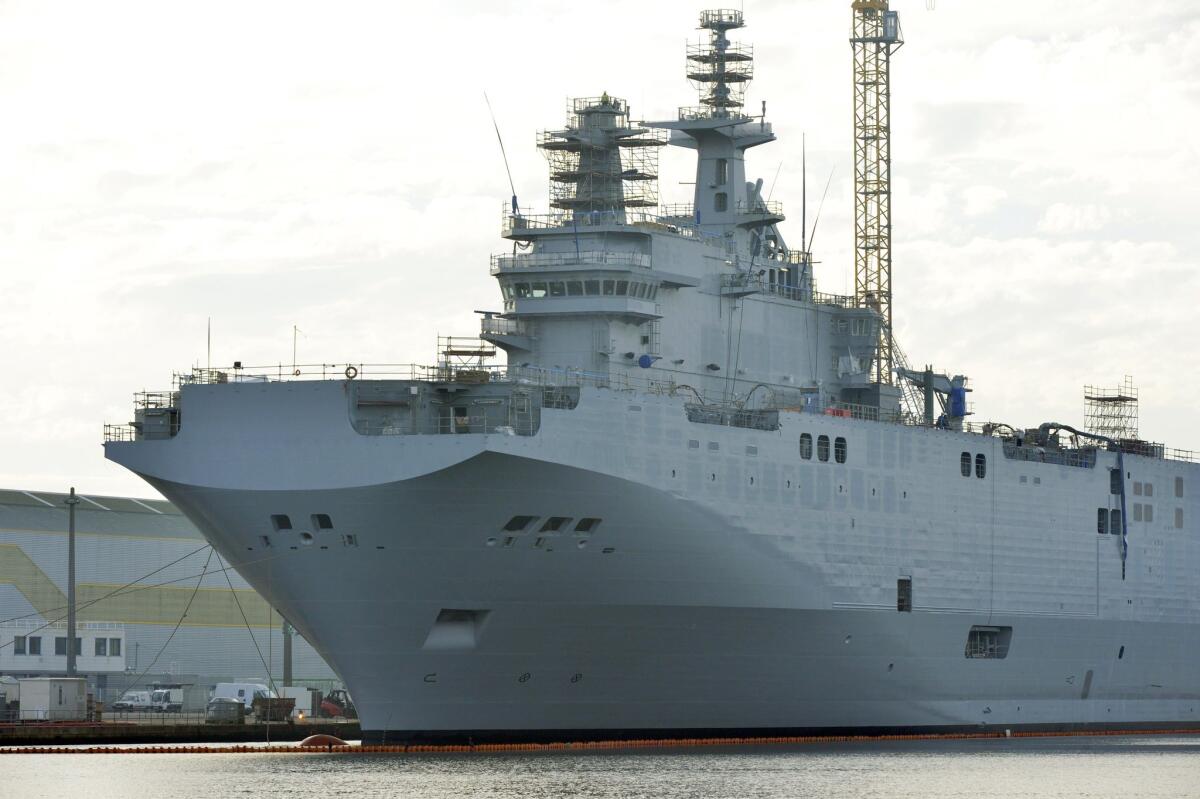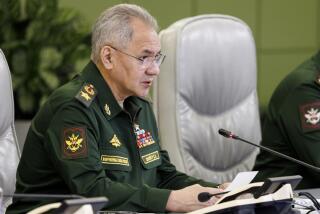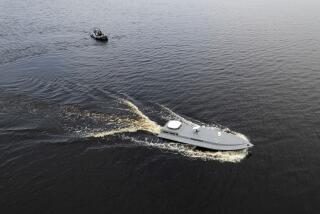France freezes warship delivery to Russia, citing Ukraine conflict

France has put on hold a controversial deal to supply Russia with two high-tech amphibious assault ships following international concern over Moscow’s military involvement in Ukraine.
President Francois Hollande said on Tuesday that delivery of the first ship, the Vladivostok, scheduled for this month, would be delayed until “further notice.”
The statement from the Elysée Palace came after Russia threatened serious repercussions if France refused to honor the $1.65-billion contract that is opposed by Washington and by Russia’s neighbors, including the Baltic states.
Around 400 Russian crew members have been training on the Vladivostok, currently in the French Atlantic port of Saint Nazaire.
After months of wait-and-see messages from the French, Hollande’s declaration Tuesday was at least clear: It would not be appropriate to deliver the control-and-command vessels given the current conflict between Moscow-backed separatists and Ukrainian forces in eastern Ukraine, he said.
“The president therefore considers it appropriate to suspend authorization of the delivery until further notice,” the statement added.
Russia’s deputy defense minister, Yuri Borisov, told the official Ria Novosti news agency that Moscow would not sue France for breach of contract “for the moment.” He added the Russians would “wait with patience.”
“Everything is specified in the contract, and we will act under that contract, just like all civilized people do,” Borisov told the agency.
In June, Laurent Fabius, the French foreign minister, had insisted that the contract had been signed and sealed and had to be honored. On Tuesday, following months of pressure from the United States, Fabius appeared to have changed his mind.
With the Russians’ delivery deadline of the end of November approaching, Fabius told radio station France Inter on Tuesday that the conditions for delivering the Vladivostok had not been met.
Hollande’s declaration was immediately slammed by Thierry Mariani, a member of the French parliament for the opposition center-right UMP party.
“This is a deplorable saga in which France is not taking a firm decision,” Mariani told French journalists. “We are in the process of creating a false suspense .... What we seem to be forgetting in all this is that we have a contract with Russia. In this case, we have above all given in to pressure from our American, Baltic and Polish friends.”
The deal to supply Russia with two Mistral vessels was concluded in 2011 by former center-right President Nicolas Sarkozy.
Since September, his successor, Hollande, has argued that the cease-fire in Ukraine must be “entirely respected” before Paris will hand over the Vladivostok and a second Mistral, named the Sevastopol -- after the Black Sea port seized by Russia when it annexed the Crimean Peninsula -- due to be delivered next year.
The 590-foot, 22,000-ton Mistral can carry 16 helicopters, four landing craft, 60 armored vehicles, 13 tanks and between 450 and 700 soldiers for up to six months.
Among French military personnel, the vessel is known as the “Swiss army knife” of ships for its multiple attack capabilities and use as a command center and hospital.
The Russians have taken an option on an additional two Mistral warships. In 2008, Vladimir Vysotsky, head of the Russian navy, said his forces would have been victorious in Georgia “in just 40 minutes” if his aging Black Sea fleet had been equipped with the Mistral.
The neighboring countries fought a five-day war in 2008 over Georgia’s breakaway region of South Ossetia, which borders Russia. After overwhelming Georgia’s military, Russia recognized the independence of both South Ossetia and another restive region, Abkhazia.
Shortly after Vysotsky made his remark, Russian President Vladimir Putin said during a visit to Paris: “I can assure you that if we purchase this armament, we will use it wherever deemed necessary.”
Willsher is a special correspondent
More to Read
Start your day right
Sign up for Essential California for news, features and recommendations from the L.A. Times and beyond in your inbox six days a week.
You may occasionally receive promotional content from the Los Angeles Times.






